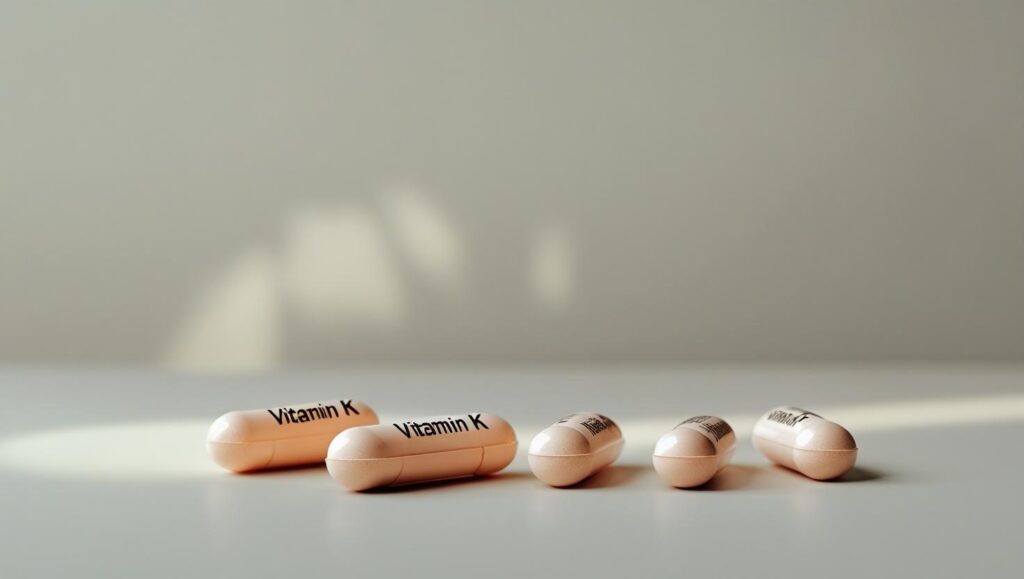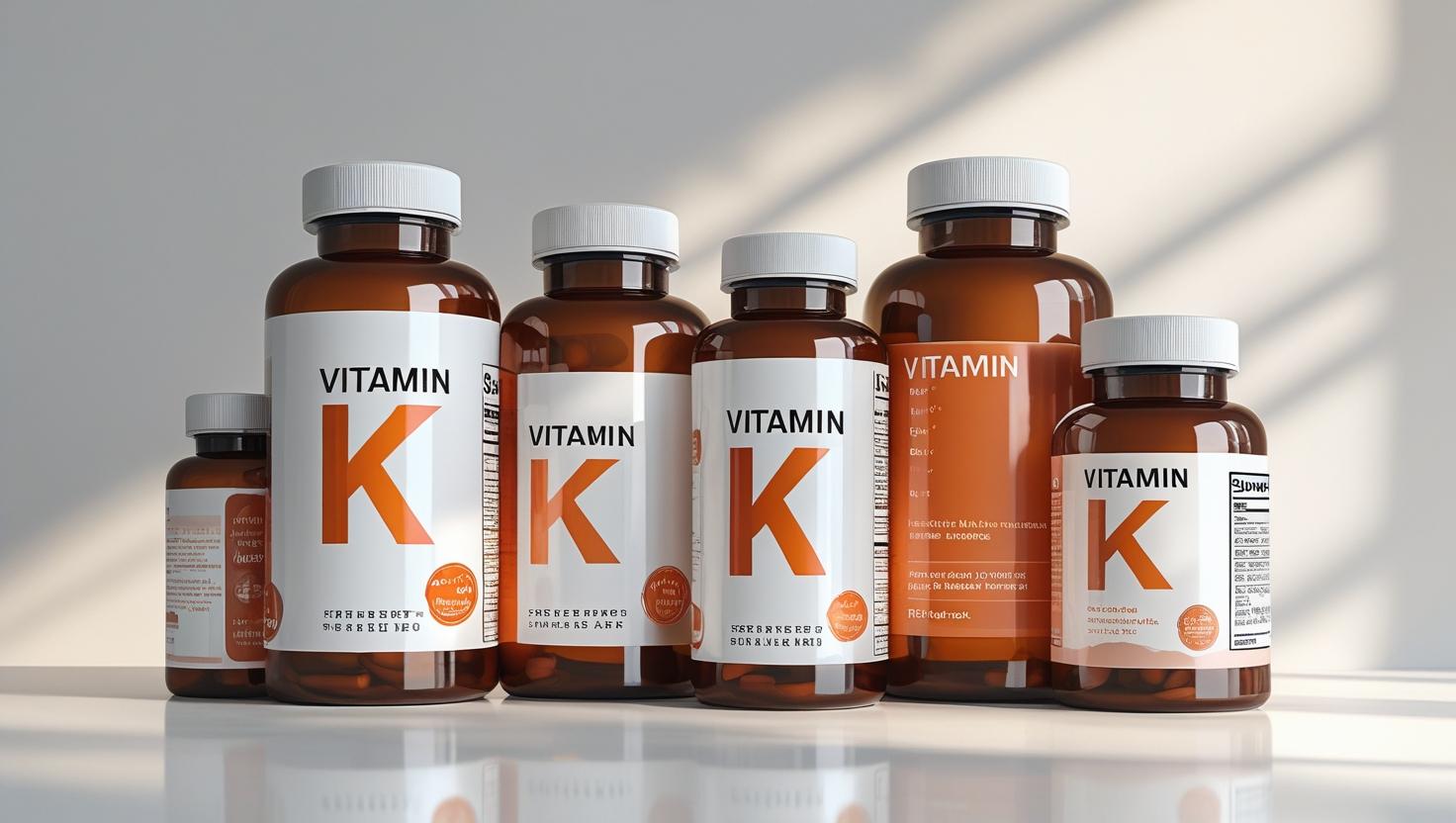Introduction
When it comes to vitamins essential for good health, most people quickly think of Vitamin C for immunity or Vitamin D for bones. But hidden in plain sight is Vitamin K, a lesser-known but critically important nutrient that plays a central role in blood clotting, bone metabolism, heart health, and even cancer prevention. Though often overshadowed, Vitamin K is indispensable to your body’s proper functioning.

What Is Vitamin K?
Vitamin K is a fat-soluble vitamin that was first discovered in 1929 as an essential factor for blood coagulation (clotting). The “K” comes from the German word Koagulation. It exists in two primary forms:
- Vitamin K1 (phylloquinone): Found mostly in leafy green vegetables like kale, spinach, and broccoli.
- K2 (menaquinone): Found in fermented foods like natto, as well as in animal products such as liver, cheese, and eggs. It is also produced by gut bacteria.
Both forms are important, but they differ in bioavailability and function. K1 is primarily involved in blood clotting, while K2 contributes more to bone and cardiovascular health.
The Functions of Vitamin K
1. Blood Clotting
One of Vitamin K’s most vital roles is in the process of blood coagulation. It helps the body produce prothrombin, a protein and clotting factor that’s crucial in wound healing. A deficiency in Vitamin K can lead to excessive bleeding or hemorrhaging, even from minor cuts.
2. Bone Health
Vitamin K plays a key role in bone mineralization by activating osteocalcin, a protein that binds calcium to bones. Research has shown that people with higher Vitamin K intake have stronger bones and are less likely to suffer from fractures, especially as they age.
3. Heart Health
Vitamin K helps regulate calcium deposition. Without enough Vitamin K, calcium can accumulate in soft tissues such as blood vessels, leading to arterial calcification, which is a risk factor for heart disease. Vitamin K2, in particular, has been shown to reduce the risk of coronary heart disease and atherosclerosis.
4. Cognitive Function and Brain Health
Some studies suggest that Vitamin K is involved in brain cell protection and cognitive performance. Low levels of Vitamin K have been associated with an increased risk of Alzheimer’s disease and dementia, although more research is needed to establish a definitive link.
5. Cancer Prevention
Emerging evidence also links Vitamin K, especially K2, to reduced cancer risk. A few observational studies have found an association between higher Vitamin K2 intake and lower incidences of prostate and liver cancer. However, more rigorous clinical trials are needed.
Sources of Vitamin K
Here are some food sources rich in Vitamin K:
Vitamin K1-rich foods (phylloquinone):
- Kale
- Spinach
- Collard greens
- Broccoli
- Brussels sprouts
- Lettuce
K2-rich foods (menaquinone):
- Natto (fermented soybeans – the richest source)
- Hard cheeses
- Egg yolks
- Chicken liver
- Butter
- Sauerkraut
Vitamin K is fat-soluble, meaning it’s better absorbed when eaten with dietary fat. For example, adding a little olive oil to your salad can help increase absorption from leafy greens.

Deficiency of Vitamin K: Who Is at Risk?
Though rare in healthy adults, Vitamin K deficiency can occur in specific populations:
- Newborns: Infants are born with low Vitamin K levels and are often given a Vitamin K injection at birth to prevent bleeding disorders.
- People with malabsorption disorders: Conditions like celiac disease, cystic fibrosis, and ulcerative colitis can interfere with nutrient absorption.
- Those on long-term antibiotics: Antibiotics can kill gut bacteria that synthesize Vitamin K2.
- People taking blood thinners (e.g., warfarin): These medications interfere with Vitamin K activity, requiring careful monitoring of dietary intake.
Symptoms of deficiency may include easy bruising, bleeding gums, nosebleeds, and heavy menstrual bleeding.
Recommended Daily Intake
The recommended adequate intake (AI) for Vitamin K varies by age, sex, and life stage:
| Age Group | AI for Males | AI for Females |
|---|---|---|
| 1–3 years | 30 mcg | 30 mcg |
| 4–8 years | 55 mcg | 55 mcg |
| 9–13 years | 60 mcg | 60 mcg |
| 14–18 years | 75 mcg | 75 mcg |
| 19+ years | 120 mcg | 90 mcg |
Most people can meet their daily needs through diet alone, though supplements are available and sometimes necessary in specific cases.

Supplementation: Is It Necessary?
For those at risk of deficiency or with specific medical conditions, supplementation may be beneficial. However, it should be done under medical supervision, particularly for people on blood-thinning medications like warfarin, as changes in Vitamin K intake can affect the medication’s effectiveness.
Vitamin K supplements often come in combination with other bone-health nutrients such as Vitamin D and calcium.
Drug Interactions and Vitamin K
Vitamin K can interact with:
- Anticoagulants (blood thinners): Can reduce drug efficacy.
- Antibiotics: Long-term use may lower Vitamin K2-producing bacteria.
- Cholesterol-lowering drugs: May interfere with absorption of fat-soluble vitamins.
Always consult your healthcare provider before starting supplementation, especially if you’re on any medication.

Vitamin K: A Nutrient Worth Watching
While it may not get as much attention as other vitamins, Vitamin K is essential for a wide range of biological functions. From keeping your blood clotting properly to maintaining bone strength and supporting cardiovascular health, this fat-soluble vitamin punches above its weight.
By including a variety of Vitamin K-rich foods in your diet, you can help ensure your body has the tools it needs to stay healthy and resilient. Whether you get it from a bowl of steamed spinach, a serving of natto, or a leafy green salad with olive oil, your body will thank you for making Vitamin K a regular part of your diet.


